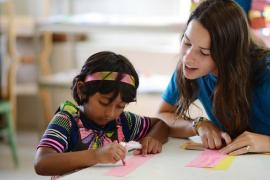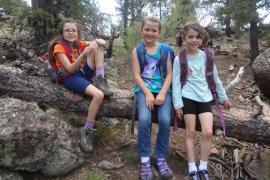This blog is part of a series that gives a snapshot of the results of the Sites, Facilities, and Programs survey completed by 2,426 ACA-accredited camps. Check out Part 1 and Part 2.
Kids who spend a few days, a week, or an entire summer at camp have fun! This is great, but within the camp community, we know campers’ experiences also result in outcomes related to physical, emotional, cognitive, social, and spiritual development. These outcomes are important because they can help market camp programs and increase enrollment. Evidence of outcome achievement can also be used to apply for funding through grants. But how do we design camp experiences that will purposefully promote specific positive developmental outcomes in campers? The answer is intentionality!
What is intentionality?
Intentionality refers to purposeful, deliberate, and preplanned actions and decisions. At camp, being intentional means using resources available in your camp to positively influence campers and staff, planning programs with the goal of meeting outcomes specific to the mission and goals of the camp. Mechanisms that promote outcomes include the structure of the camp, high quality program design, and the level of engagement of the participants When camp professionals purposefully design camp programs, desired outcomes are more likely to occur.
What are camps doing towards intentional programming?
We learned from the 2017 Site, Facilities, and Programs Survey that both resident and day camps plan programs to achieve desired camper outcomes. Specifically, over 60 percent of camps have reported being intentional about the following outcomes: social skills (manners, making friends, etc.), character outcomes (honesty, etc.), physical activity, 21st century/life/non-cognitive skills, and healthy eating.
Interestingly, the percent of camps that measure the outcomes they are programming for is quite low, ranging from 6 percent to 25 percent, depending on the outcome. When we not evaluating camper outcomes, we cannot determine if our intentional program planning has been successful. We know from past industry research that ACA’s Youth Outcomes Battery is one tool that helps camps easily measure camper outcomes and might be something to check out if you are targeting specific outcomes but do not yet have a way to evaluate the results.
How can we be more intentional?
- First ask yourself: What is it should campers know and how should they behave when they leave this camp? For some camps, this question is answered by looking at the mission statement; for others, this question would be the great basis for a brainstorming exercise with camp planners.
- Once you know what you are aiming for, you can ask the following: When at camp are campers most likely to achieve these outcomes? This might be a simple exercise of adapting existing programs to meet your outcomes, or it could mean designing new programs from scratch.
- Finally, decide how you are going to know if your campers achieved the outcome or outcomes for which you designed your program. Surveys, interviews, focus groups, and games just some of the ways you can assess the effects of your intentionally-designed program.
Here’s a tool: Logic models!
Logic models can be helpful in understanding how elements of a program connect with desired outcomes. On a blog post a couple weeks ago titled “Tips and Tricks for Developing a Logic Model,” Lisa Westrich discusses logic models and their relevance to program outcomes. She explains how to create a logic model and the benefits they can provide for camps.
The 2017 Site, Facilities, and Programs Survey suggests that the camp community is intentionally targeting youth development outcomes in their program planning. One of the best things about intentional camp programming is there are infinite ways you can design programs to meet your outcome goals. Intentional program planning allows every camp to design unique ways to meet its own goals, mission and values. Intentional camp program is a key that can unlock the true power of each camp’s youth development potential.
Check out the Sites, Programs, and Facilities full report.
Melanie Gauci, MS, is a Master’s student studying Parks, Recreation, and Tourism and a graduate assistant for the American Camp Association.
Photo courtesy of Fraser Valley Metropolitan Recreation District, Fraser, CO.
Thanks to our research partner, Redwoods.
Additional thanks goes to our research supporter, Chaco.
The views and opinions expressed by contributors are their own and do not necessarily reflect the views of the American Camp Association or ACA employees.




